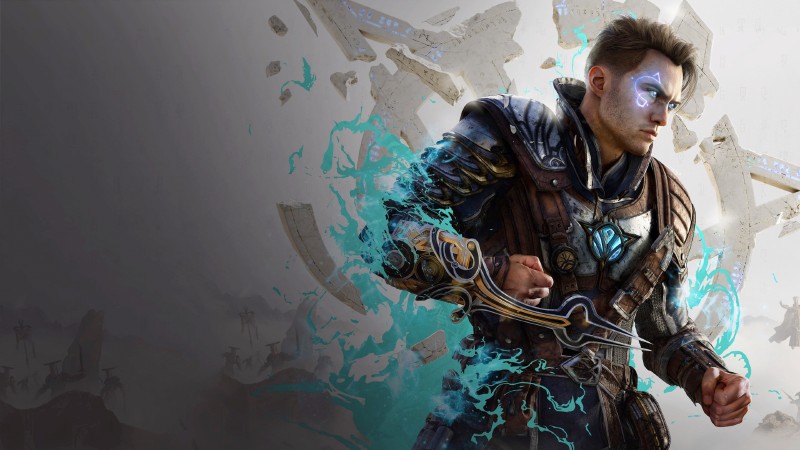
Immortals of Aveum is an upcoming action game that mixes a fantasy world and its magic with first-person shooting. We've played a chunk of it and enjoyed it – read our full hands-on preview thoughts here – but now, we've heard a track from the game's score. And you can too because we can exclusively reveal that track today.
It's big, robust, and heroic, fitting if the full game is anything like what we've gone hands-on with. After listening to this track, we interviewed the game's audio director Aubrey Hodges, composer Jamie K, and media composer Tom Hawk about the game's score, how the team created a soundtrack that blends hip-hop with orchestral arrangements, and so much more.
Q&A With The Composers Of Immortals Of Aveum
How would you describe the score and/or soundtrack of Immortals of Aveum?
Aubrey Hodges: The score for Immortals of Aveum is a hybrid of several genres that have been fused together to create a very wide palette of sonic texture and style. Flavors of hip-hop, orchestral, electronic, chill, ambient, industrial, and a few others all come together to form a cohesive experience and immerse the player into a world that feels unique and, at times quite unexpected. We wanted to provide a soundscape that allowed all sorts of interesting and captivating sounds to fuel the imagination and excite your ears.
Jamie K: My goal was to create a new musical and sonic experience that would feel fresh to listeners. I easily get bored with the same old, same old score techniques and sounds, so Immortals of Aveum is an eclectic mix of modern sounds and experimental textures combined with classical elements used in interesting ways. One organic soundscape you will hear throughout the game is a variety of woodwind textures, especially in ambient exploration pieces. I was drawn to the deep richness of an instrument called a bass ocarina which has warm low earthy tones. Those tones are foundational to guide the player to feel grounded in Aveum as they explore and enjoy the mystery of this new world.
Tom Hawk: The way the vision for the score was described to me by Aubrey was fantasy orchestral music meets aggressive modern electronic/industrial music. That was the core focus of the score, but it certainly has other interesting elements to it. The music is a big combination of different styles and genres and lots of different instruments.
Where did you find inspiration for the game's music?
Hodges: Honestly, the game itself was the primary inspiration for the score. Aveum is a breathtaking world with incredible vistas and locations to explore. Each level has a unique feeling and spurs imagination and creativity just by being there. Once we determined what sort of flavor and style we wanted for an area, we just got creative and let loose in the studio. At times this would be in more of an ambient flavor, and at other times this might be more melodic and structured.
JK: I honestly would have never composed this style of music if Aveum hadn’t been created so beautifully by the artists. The world of Aveum drew out new things from me as a composer. When I saw pictures and scenes of the spacious detailed landscapes, I felt drawn to create spacious captivating compositions. I also found connection and inspiration in the epic women warriors of the game; these are no run-of-the-mill video game girls. Zendara and Grand Magnus Kirkan are dare-you-to-mess-with-us, epic, and intelligent, you’re-lucky-to-kill-bad-guys-beside-us kind of ladies. Those are my kind of comrades, and they needed some hard-hitting fire combat music to go to war with. Iron sharpens iron and I enjoyed the challenge of developing the music experience of this new IP.
How did you meld the more fantastical sound typically associated with fantasy and magic with the more modern and industrial sound typically associated with shooters, if at all?
Hodges: This was one of the reasons I made the decision to specifically go after a more hybrid approach to the score. By incorporating a blend of the "Hollywood orchestra" with other genres, it allowed us to blur the lines between game genres and potential expectations based on other products out there. We used all sorts of musical elements and sounds in several different genres of music. This allowed us to have the sonic impact of the bombastic orchestral music usually associated with combat and still allowed us to do some more unique flavors as well. We didn't want to get boxed into a specific set of rules per se. So, we just had fun and allowed the styles and genres to blend and blur however they materialized in each case. It was liberating to be creative and not have to worry so much about fitting into a rigid set of rules.
JK: From the beginning, Bret gave me freedom to experiment with sound [and] he wasn’t afraid of trying new things – like putting shooters and magic together. One of my favorite things was that when I brought in new elements, I was often met with, “That’s interesting, I like that.” I think the fantasy element was able to break us free of genre constraints other established titles might face during their scoring process.
Hawk: When I came on board, the overall vision for the score was well established but still allowed for a lot of experimentation and exploration, which was a lot of fun. Sometimes it needed soaring orchestral music, and often the orchestra was accompanied by the power of thundering percussion and analog synthesizers; while other times, there was more of a focus on modern aggressive sounds, particularly for combat music. We worked hard to make this fusion of musical styles seamlessly blend together rather than feeling like they were forced together. For example, the main theme for the game – written by Aubrey – has a strong orchestral presence, but in a combat track, which focuses more on aggressive modern sounds, the main theme might be hinted at in edgy synthesizer sounds, rather than orchestral instruments like French Horns or choir. Even with some of the most aggressive combat tracks, there is always some level of orchestral presence there to help combine the shooter and magic styles.
Has any of your previous work inspired some of the music in Immortals of Aveum?
Hodges: My ambient score techniques for the Doom and Quake series probably lent some inspiration to a few places in Immortals. Not so much directly since those products were far darker and the setting in those was terribly grim, but in a more general sense.
JK: I have an interesting background of growing up studying classical piano. Composers like Beethoven and Chopin are so ingrained in my fingers, I find classical techniques always influence my composing style, in a good way. But from a young age, I always was drawn to other genres of music as well. When I was in high school, I remember hearing Alicia Key’s album “Songs in A Minor” for the first time and was inspired by how she used her classical piano background but combined it with her soulful voice and R&B song structure, creating such a fresh sound for her generation. So, my interest and writing in different genres brings fresh perspective to the game industry because I’m never going to compose the status quo game score.



